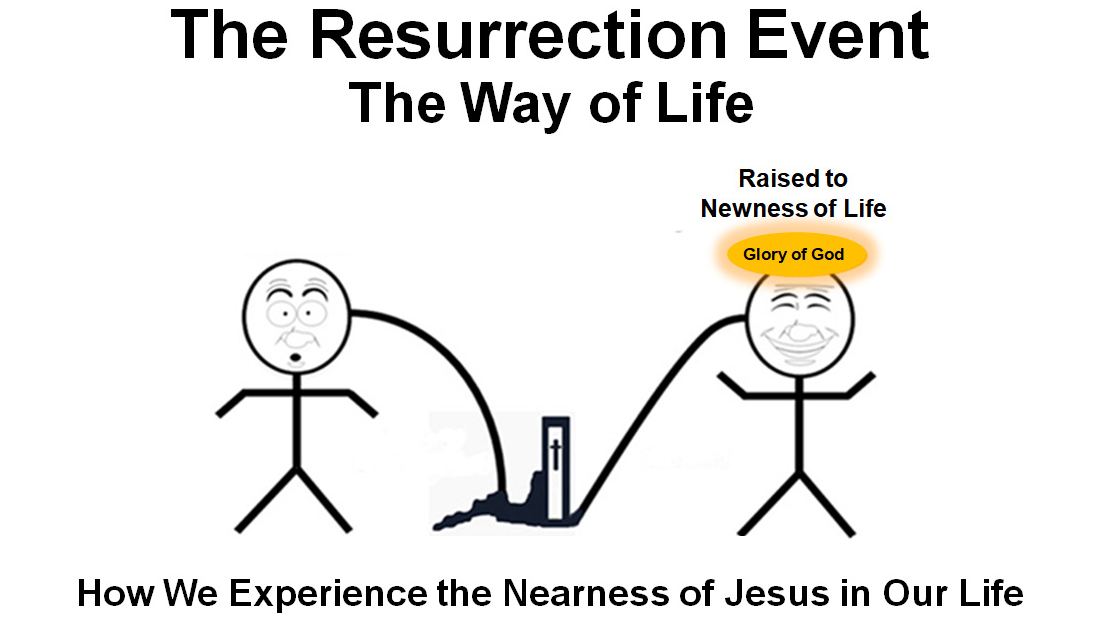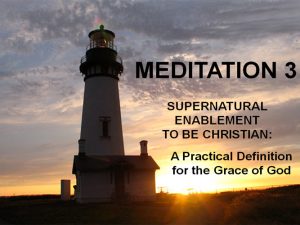The way of life, the resurrection event, is how we experience life.

I would like to begin by asking a question. You see a rose, and an apple and a tomato.

What do they have in common? They all have to be planted. The seed of the rose has to be planted. The seed of the apple has to be planted. The seed of the tomato has to be planted. It is the way of life.
In addition, we can actually say that the bloom of the rose is the fullest manifestation of life from the planning of the seed that the rose bush can produce. The apple is the fullest manifestation of life the apple tree can produce from the planning of the seed. A tomato is the fullest manifestation of life that the tomato plant can produce from its seed. The rose, the apple, the tomato, in fact, all living created entities must go through the same process of having a seed planted and then being raised to newness of life.
We, human beings, are also a created entity. Do you think we have to go through the same process? Do we go through the process of a seed being planted and new life coming forth out of the planting of the seed?
The way is fully explained in the Scriptures.
The Scriptures will explain this process that all living created entities experience. We will examine some very familiar passages of Scriptures but look at them from a different vantage point. First, let me ask you another question that I have been asking people everywhere I go. I have asked high school students, college students, seminary students, church congregations, and home meetings: “Why did Jesus come into this world?” The answer that is consistently given regardless of where I asked the question is that Jesus came to die on the cross for the penalty of our sins that we might be saved.
Let me ask a third question, what could cause a little group of fishermen, common laborers, and a tax collector to be so radically changed in their lives that they could profoundly affected their society. Yet, in today’s world, sixty-five to seventy percent of Americans are Christians and the moral fiber of America seems to be going in the wrong direction. The early followers of Jesus changed their world and it seems that we have little effect upon our world today. What made the difference?
I have come to the conclusion that the early believers significantly understood something about Christianity that is remarkably different than most of Christianity today. What cause the early followers of Jesus to be so radically changed that they could profoundly affect their world?
Let me put the last two questions together. Why did Jesus come into this world and what radically changed the early followers of Jesus. I wonder if it has something to do with the rose, the apple, and the tomato. If I could hold up a miniature human being along side the rose, the apple, and the tomato does it have something in common with them. It seems that all four of them do have something in common.
The seed of the tomato has to be planted to get the tomato. The seed of the apple has to be planted to get the apple. The seed of the rose has to be planted to get the rose. There is also something that has to be planted in the life of a human being. In order for a person to experience what he is suppose to be experiencing there is also a seedtime and a harvest. We also will go through the same cycle as the apple, the tomato, and the rose. It is the way of life.
The way is the resurrection event of all living creation.
All four of them experience what I call a resurrection event. It is interesting to note that it is not until the thirteenth chapter of the book of Acts that the early followers of Jesus were called Christians. The title Christian is a designation that the world put upon the early followers of Jesus. They did not label themselves as Christians.
Prior to the thirteenth chapter of Acts there is a little phrase that keeps being repeated. In the first years following the death and resurrection of Jesus, the followers of Jesus were known as people of the way. Unfortunately, the phrase “the way” has often been used by various Christians groups down through the years. I say unfortunately because in most instances it was not and is not used as the early followers of Jesus used the phrase.
The disciples were on a boat crossing the sea and a storm came up and their cry was, “we perish.” What change them from a group of people who seem to think they were perishing when the storms of life occurred to become uncompromisingly bold in the face of their actual death. Their willingness to be kill by the cross, by the sword, and by being stoned did not bring forth cries of “we perish” but “we live.” What happened to them that changed their cry “we die” to “we live” in the storms of life? They understood the way.
What was it that made this small group of people to be so radically changed that they would be enabled to grow from one congregation in Jerusalem to many congregations along the coast line of the Mediterranean Sea in one generation? They not only crossed geographical boundaries but they also move from basically a very rural community to urban communities. What enabled them to change their language from Arabic, to Greek, to Latin? What caused them to be able to cross cultural boundaries?
What enabled fishermen and common laborers to cross major transitions in one generation? Transitions that we say hinders our proclamation of the gospel today. It seems that this first generation of disciples rapidly went through these transitions without any problems. What was it that radically changed their lives to empower them?
As I asked that question in a local church setting, one of the older members spoke up and said, “Well, Paul had an experience with Jesus.” He gave the right answer. But, what kind of spiritual experience was it?
The early followers of Jesus had what I have been calling lately a profound resurrection experience with Jesus. It would be like I am talking to you but then I would leave. You would then hear in a couple of weeks of my death. Then, I would later show up again in your presence. Is this not an example of how Paul actually experienced the risen Jesus? A great number of Christians could and would say that Paul did have a profound Christian experience with the risen Christ. However, what does that really mean?
The way of the resurrection event is explained fully in Acts Chapter 9.
If you want to follow me in your Bible, turn to the ninth chapter of Acts to examine this profound resurrection event in the life of Paul. I think it can be said, if we examine the Scriptures closely, that this same experience happened to Peter. In fact, I think it happened to all the key early followers of Jesus. Thankfully, we have it recorded for us specifically in the life of Paul. Luke, the historian, wrote,
Saul, yet breathing out threatenings and slaughter against the disciples of the Lord, went unto the high priest, And desired of him letters to Damascus to the synagogues, that if he found any of this way [literal translation, the way], whether they were men or women, he might bring them bound unto Jerusalem (Acts 9:1-2).
What does this way, the way, mean? There is good news and bad news in understanding the way. It is bad news in that it challenges our egotistical desire to want to be responsible for our lives. It seems that most of us want to be able to say I earned what I receive from the Lord. Even most people who emphasize the need for an experience with Jesus would say “Yes, it is all God but he has to have people who will yield to him.” If that was true would then we not be able to say that it was my yielding that enable God to move? It is extremely hard for us to get our self out of the picture as we experience the presence of God.
As we go through this, I want to be sure that we understand something very significant. I am where I am today because I have had a part to play in where I am. We do have a part to play in it, but we have so misconstrued true Christianity we often miss the truth. When we make the statement that we have a part to play in where we are today, most think they are where they are based upon something positively they have done: the decisions they have made, the prayers they have prayed, or the rituals they have performed.
Actually, we are where we are today but it is not a positive part it is a negative. Meaning, if we did not have so much a part to play in it, we would be a lot further down the road than we actually are. We are never going to get away from the realization that we do have a part to play it. But, it is not a positive part it is a negative part. I am actually doing something that is prohibiting me from further understanding what true Christianity is. This is a very powerful life-changing concept, if we can grasp it.
As we work through the resurrection event, I want us to realize that this is not a laissez-faire concept. The term laissez-faire just means you simply flow through life merely letting what happens happen. Experiencing true Christianity, however, is totally different than laissez-faire. This way of life is not to say that you can make the true issues of life to happen. Rather, it is to say that it is how you are responding to what is happening that is the real issue.
We are talking about a resurrection experience by the power of the Holy Spirit. Coming out of my background, we emphasized resurrection power. We try all sort of things (prayer, fasting, energetic worship) to experience it. We believed that we could experience resurrection power if we just prayed enough, if we just believed enough, or if we could someway just talk our mind into it. In reality, however, experiencing true resurrection power is less something you do. If it was our faith, if it was our belief, is that not still something we are doing to earn the blessings of God. Mysteriously, to experience resurrection power is less what you do than it is how you are responding to what is occurring in your life. In addition, how you respond will be governed basically by what is going on in your mind.
Again, I want to make it clear as we go through this, it is not a laissez-faire just let what happens happen. I cannot control the setting of the sun and I cannot control the rising of the sun. Even though when I am tossing and turning in bed at three o’clock in the morning I would desire that the morning would hurry up and get here. The coming of the morning would enable me to do something to occupy this mind that is causing me to toss and turn.
Although I cannot control the real issues of life from happening, what is happening in my mind can be controlled. I cannot control the setting of the sun or the rising of the sun, but how I am responding as the sun sets and rises can be controlled. Let me clarify a point. As you are tossing and turning unable to sleep, you do not have the capability, as you well know, to say forget this I am not thinking about this anymore. I am going to sleep. You cannot control the mind, but it can be controlled. We will discover how the early followers of Jesus learn to have their mind controlled.
The way is experienced by Paul on the road to Damascus.
Let us see what happened to Saul in Acts Chapter 9:
Saul, yet breathing out threatenings and slaughter against the disciples of the Lord, went unto the high priest, And desired of him letters to Damascus to the synagogues, that if he found any of this way, whether they were men or women, he might bring them bound unto Jerusalem. And as he journeyed, he came near Damascus: and suddenly there shined round about him a light from heaven (Acts 9:1-3).
We all recognize this great experience Saul had on the Damascus road. We recognize it as a life-changing experience. We can say that he truly had a resurrection event.
The question is what did he do to cause this event that changed his life to occur? Did this event come about by his praying? Did it come about by his fasting? Did it come about because of any of his deeds?
Saul is actually doing what he considered his ordination in life, to persecute those of this way. Unlike Saul, I doubt very seriously that any of us will ever be knocked off of a donkey. We simply do not ride donkeys today, but you are riding something to get you from point A to point B. There is something going on in your life that you could say this is how I am going to live today and tomorrow. This is what is going to get me to where I want to go. However, like Saul, you are riding something and whatever you are riding you will be knocked to the ground.
It is like you go into work tomorrow and when you walk into work the boss says I want to talk to you. The first thing he says is I hate to let you know it like this, but you are being let go. I have to lay you off from work. You no longer have a job.
Basically, this is actually what happened to Saul. It is an event in his life that we so spiritualize we forget about what is actually happening in his daily life. This is an event that occurred as he went about his business for that particular day. The way always occur in the events of daily circumstances.
Suddenly, there is a light that shown around about him from heaven. I wonder how many times there has been a light from heaven around about us and we did not realize what was happening. We actually were visited by Jesus and did not recognize it.
There is a reason why a light came from heaven and Saul fell to the ground. He went down. He was taken down. Or, he fell off his donkey. He fell off of what he was depending upon to get him where he thought he was going.
The way of life is simply not understood by most Christians.
How many times has that occurred to us? How many times has that occurred to me and I did not have a clue that God was at work. In fact, we have messed up Christianity so much that when that occurs we blame the devil for it. We think we are under attack from Satan.
Luke recorded, “And he fell to the earth, and heard a voice saying unto him, Saul, Saul, why persecutest thou me” (Acts 9:4)? How could Jesus say to Saul, “why persecutest thou me,” on the road to arrest people.
To illustrate the point, in the Christian world today, I wonder if Jesus would say, “why are you persecuting me.” I have traveled a lot in the last few years averaging about a hundred thousand miles a year. I have come across a lot of people and talked in depth with most of them. I have come to realize that there is a major box, a major shift of thinking, that most Christians need to experience.
It is a very simple truth that many are beginning to recognize, but by and large it is not understood by most Christians. Christianity is not you living for Jesus, living for Christ. True Christianity is actually Christ living in and through you. I have made that statement now for several years and some are coming to recognize its truth. However, if that statement is made in the average church today, you will get a lot of strange looks from the people in the congregation.
How could Jesus say to Saul, “why persecutest thou me?” The reason why he could say that was simply because those early followers of Jesus knew that they were not living for Christ, at least most of them. They were not following Christ as a philosophy. They were not following Christ as a code of ethics. They were not following Christ because the Book said to do it. They knew that it was Jesus living in and through them. For them, persecuting true believers was actually persecuting Jesus.
The way of life is usually resisted by “kicking against the pricks.”
Luke recorded Saul’s response to the words he heard from heaven, “Who art thou, Lord? And the Lord said, I am Jesus whom thou persecutest: it is hard for thee to kick against the pricks.” In the past, I would go into the culture of their day and talk about the plank or the board that was put in the harness of the oxen. The spikes in the board would prohibit the oxen from kicking to get them moving forward. After I would go through it, we could all say now we know what kicking against the pricks mean. We would all become a little more knowledgeable about the Scriptures. Did that bit of knowledge change our lives? Probably not.
What did Jesus mean when he said, “it is hard for thee to kick against the pricks?” It has to do with understanding the way. Let me jump ahead a little bit and say that God has taught us over and over again in life the way of God. The day passes and we are taken down at night to rest and then raised in the morning refreshed. Springtime comes after winter as it was said after the great flood: “While the earth remaineth, seedtime and harvest, and cold and heat, and summer and winter, and day and night shall not cease” (Gen. 8:22). There is a way of life that we all experience.
Questions need to be raised: “In this way, does the tomato knowingly kick against the pricks,” “does the apple knowingly kick against the pricks,” or “does the rose bush knowingly kick against the pricks?” Sadly, kicking against the pricks is a characteristic known only by human beings.
It is sort of like a cattle prod with its charge of electricity to get the cattle to move in the direction they should go. It is how God uses the circumstances in our lives to move us where he wants us to go. As those circumstances happen, if we are not careful, we will kick against those pricks.
We kick against what God is doing because we do not understand what he is doing. We do not understand these resurrection events. We keep trying to get to where we think we should go by something we do. We do not understand that God get us there by many resurrection events that keep occurring in our lives. Over and over and over again, every day, we are taken down to be raised. God has been teaching us, as we have stated, that he takes us down at night to raise us up refreshed in the morning.
What happens when we are not refreshed when we are raised in the morning? Our mind simply would not be shut off in the night. God could basically say, I have been teaching you all the days of your life but you cannot keep your mind out of it. You keep looking for something you need to do instead of recognizing you have blown it by what you are doing. We try to convince ourselves that we are not believing enough, have not formulated the right doctrine, or the right understanding. Jesus would simply say, “it is hard for thee to kick against the pricks.”
Perhaps, a warning needs to be given. When things are going smooth, we could possibly think that we have arrived and we no longer kick against the pricks in the circumstances of life. However, I now understand that it is only the religious person that will think in that way. The fact of the matter is we often will still kick against the pricks.
Did Jesus kick against the pricks? His prayer in the Garden of Gethsemane is his wrestling with what God was doing in the circumstances of his life. It is not a matter of getting to a place where we will not kick against the pricks.
Jesus did not say to Saul I want you to get to the place where you do not kick against the pricks. He said to Saul, “it’s hard for thee to kick against the pricks.” It gives us a little clue to where the battle for the good life is fought. To the degree we kick against the pricks is the degree of hell we will experience in life.
The way, when we respond correctly, will always bring a refreshing morning.
After Saul heard Jesus say, “it’s hard for thee to kick against the pricks,” he “trembling and astonished said, Lord, what wilt thou have me to do?” (Acts 9:6). Saul was taken down and he would be raised. If God takes the tomato seed down, the apple seed down, and the rose seed down, is he not also going to plant seeds in the life of every man?
Some might say that if you believe that Jesus was taken down for you then you will not have to be taken down anymore. One well-known television evangelist said he was so tired of hearing people talk about Christians suffering. He stated that if you believe Jesus died on the cross, suffering for you, then you do not have to suffer anymore. If the apple goes through the process year after year, if the tomato goes through the process year after year, and if the rose goes through the process year after year, man will also go through the process again and again and again. As we will see, even after Saul’s initial resurrection event, he would suffer many more things.
Jesus said to Saul, “Arise, and go into the city, and it shall be told thee what thou must do.” Then Luke recorded, “And the men which journeyed with him stood speechless, hearing a voice, but seeing no man” (Acts 9:6-7). Who are these people that journeyed with him which stood speechless hearing the voice but seeing no man? Who were these people? They were the religious folks traveling with Saul.
Organized Christianity by in large today has little clue to what God is doing in the life of a true believer. Religion can never grasp it, never will grasp it, because it is counter to the very essence of which they put their hope. Where do religious people put their hope? They put it on their doing, their ability to do. They just do not understand the way of the resurrection event.
Luke recorded,
And Saul arose from the earth; and when his eyes were opened, he saw no man: but they led him by the hand, and brought him into Damascus. And he was three days without sight, and neither did eat nor drink. And there was a certain disciple at Damascus, named Ananias; and to him said the Lord in a vision, Ananias. And he said, Behold, I am here, Lord. And the Lord said unto him, Arise, and go into the street which is called Straight, and inquire in the house of Judas for one called Saul, of Tarsus: for, behold, he prayeth (Acts 9:8-11).
I wonder what Saul was praying. I received an email from one of the groups I had been meeting with for a while. He said when you come this time I would like for you to address prayer. He went on to ask can we really manipulate God? Can we really pray a prayer that changes God’s actions? Is God answering our prayer, or do we by our prayers just come more in line to what God is doing in our lives. What about prayer? What about praying?
When I received that email, the thought that came to me immediately was a prayer that Jesus prayed. Even though the word prayer is not used, I do not think we are misconstruing the Scriptures by inserting the thought. Jesus said, concerning his approaching death, “Now is my soul troubled; and what shall I say? Father, save me from this hour: but for this cause came I unto this hour” (John 12:27). Did he pray for the Father to save him from the hour he was facing? There actually seemed to be no thought of praying for his physical deliverance. He simply stated that it was for this hour that he came into the world.
Most of the prayers we pray in our life has something to do with the physical world, has something to do with the physical circumstances we are facing. If you look closely at the prayers in the New Testament, especially the statements of James on prayer, it is quite challenging. The writing of James is one of the earliest records we have in the New Testament. He raised this question, “From whence come wars and fightings among you (James 4:1)?” Then, he stated, “Ye ask, and receive not, because ye ask amiss, that ye may consume it upon your lusts” (James 4:3). Are our prayers consumed with the physical world, consumed with our desires of physical things?
In the Philippian letter, Paul stated that he is prison. He then added that he knew his imprisonment would work out to his salvation. The three reasons why he knew that it would be to his deliverance were because of the prayers of the Philippians, because of his hope in the gospel, and because of the working of the Spirit of God in his life (Phil. 1:19-20). I do not believe that the saints in Philippi were praying, necessarily, for God to rescue Paul from prison. I do not think they were praying about anything specifically physical. I think their prayers were like most of the prayers found in the New Testament: the desire to see Jesus, the desire to understanding the gospel, and the desire to be transformed into the image of Christ.
To the saints in Ephesus, Paul wrote,
Wherefore I also, after I heard of your faith in the Lord Jesus, and love unto all the saints, Cease not to give thanks for you, making mention of you in my prayers; That the God of our Lord Jesus Christ, the Father of glory, may give unto you the spirit of wisdom and revelation in the knowledge of him: The eyes of your understanding being enlightened; that ye may know what is the hope of his calling, and what the riches of the glory of his inheritance in the saints, And what is the exceeding greatness of his power to usward who believe, according to the working of his mighty power . . . (Eph. 1:15-20).
I am not saying that we will ever get to the place that we will never pray for anything in the physical world. We are human beings and we do have longings for God to work in the earthly realm. We may desire for God to do something in the physical, but, like Jesus, our prayers will also be “nevertheless not as I will, but as thou wilt” (Matt. 26:39).
In the next chapter, I want look at a story out of Daniel, which I think is the most precise detailed description of New Testament Christianity found in the Scriptures. The story will actually tell us what it looks like for the Christian to be raised to newness of life in a resurrection event. It reveals that the experiences of life in themselves may not be the relevant factor of life. As we will see, it is actually how we are responding to those experiences that is the most important issue of living life.
On the Damascus road, Saul had been taken down and raised again. Being greatly affected by this resurrection event, Paul prayed and saw in a “vision a man named Ananias coming in, and putting his hand on him, that he might receive his sight” (Acts 9:12). Like the believers on the last feast of Pentecost when the Holy Spirit fell upon them (Acts 2:1-38), Saul would now have a new way of looking at life. He would never again see things as he had seen them before this resurrection event on the road to Damascus. He was made blind but now his eyes would be opened anew to forever see differently.
After Ananias was reassured that the man who had done “much evil . . . to [the saints] at Jerusalem . . .[and had] authority from the chief priests to bind all that call on [Jesus’] name” (Acts 9:13-14) had been changed, the Lord told Ananias “Go thy way: for he is a chosen vessel unto me, to bear my name before the Gentiles, and kings, and the children of Israel” (Acts 9:15).
The way of experiencing a resurrection event will profoundly change you.
This resurrection event would profoundly change Saul in what would be occurring in his life. He was now chosen to lift up the name of Jesus to “the Gentiles, and kings, and the children of Israel.” He would now see things very differently. For the Lord told Ananias, “For I will shew him how great things he must suffer for my name’s sake (Acts 9:16).
In other words, in the future Saul was not going to get out of suffering, out of more resurrection events. We have Christianity so messed up that we have been told that if we can get our faith right, get our doctrine right, and get our understanding right we will eliminate all future suffering. I think it is safe to say that Saul would become the great spokesperson for God only because he would be shown “how great things he must suffer for my name’s sake.”
Luke finally finishes the story of Saul’s Damascus road experience:
And Ananias went his way, and entered into the house; and putting his hands on him said, Brother Saul, the Lord, even Jesus, that appeared unto thee in the way as thou camest, hath sent me, that thou mightest receive thy sight, and be filled with the Holy Ghost. And immediately there fell from his eyes as it had been scales: and he received sight forthwith, and arose, and was baptized. And when he had received meat, he was strengthened. Then was Saul certain days with the disciples which were at Damascus. And straightway he preached Christ in the synagogues, that he is the Son of God ((Acts 9:17-20).
What is primarily happening in this story is what I am beginning to understand as a powerful resurrection event. This resurrection event in the life of Saul is not an isolated incident in the New Testament. We do have specific descriptions of Paul and Peter’s resurrection events recorded for us, but I think it happened to all of the early disciples of Christ. This is a story which occurred in all the lives of the early followers of Jesus.
Saul, later called Paul, described the resurrection events that occurred in his life. He said, “I am crucified with Christ: nevertheless I live; yet not I, but Christ liveth in me . . .” (Gal. 2:20). I used to preach, as you hear it mostly preached today by those who put a lot of emphasis on faith, on believing, or on other works, that in some way two-thousand years ago when Christ died on the cross I died with him. Did Paul mean when he said I am crucified with Christ that in some magical or mystical way when Christ died on the cross some ten-to-fifteen years earlier that he believed he died with him?
One well-known scholar has said that if you can see Jesus on the cross you can be forgiven of your sins. Then, he added, if you can see yourself on that cross you can become sanctified, set apart for God. The answer that he was giving to you, as I also gave to you in the past, is that you must see Jesus on the cross and you must also see yourself on the cross with Jesus.
As I preached in years gone by, that in some way when Christ died on the cross I must believe, must understand that I also died with him. Unfortunately, or perhaps in the long run fortunately, our mental effort just will not work. Oh, in issues that are not really issues we might have the will power to overcome them. However, in issues that are heavy-laden emotional issues, trying to believe that you died with him will fail every time. When we do fail, we then say it was because we were not believing hard enough. Successful Christian living then becomes a mind game to try to increase our faith.
The way is how we are crucified with Christ.
There is no question that Paul was crucified with Christ. The question is when was he crucified with Christ? Was it when Jesus died on the cross? Or, was he crucified with Christ on the Damascus road? I now understand it was the Damascus road experience, one of many resurrection events he would experience in his life, which allowed him to say I am crucified with Christ. It was as he wrote to the Corinthians,
Always bearing about in the body the dying of the Lord Jesus, that the life also of Jesus might be made manifest in our body. For we which live are alway delivered unto death for Jesus’ sake, that the life also of Jesus might be made manifest in our mortal flesh (2 Cor. 4:10-11).
Paul wrote to the Romans, “What shall we then say to these things? If God be for us, who can be against us”(Rom. 8:31). It is a great statement that we have heard preached many times. We often try to put a charismatic spin on it by saying when tough times come just remember that if God is for us who can be against us. It seems we are trying to convince our self that no one can really be against us if God is for us.
I do not think that was the intention of Paul. What Paul would say, and Peter would also say, if you believe in the death and resurrection of Jesus Christ why then are you struggling in this current situation where you are being taken down by the circumstances of life. They are both implying that as God raised Jesus he will also raise you. The morning of any struggle will always come because it is the way of life. No one can keep the sun from setting and the sun from rising in the morning.
I used to give a little demonstration when I was more inclined to motivate people to do something. I would take a balloon and stand before an audience. I would not say anything just begin to blow into the balloon. When it would become about the size of a volleyball, I would pause and say, “the more you put into this the bigger it gets.” I would continue to blow more air into it. When it became about the size of a basketball, I would pause in blowing up the balloon and say. “the more you put into it the bigger it gets.” I would once again begin to blow more air into the balloon. Guess what the message would be? You are going to get out of life, out of this service, only what you put into it.
I still use that little gimmick. However, I have changed it somewhat. As I now blow into the balloon, it would become so large that the people in the front row would begin to get nervous. I would then tie the neck of the balloon and hold it up in front of the people. I had taped a pin on my finger and when no one was expecting it I would burst the balloon. The real message is not so much the more you put into it the bigger it gets, but what do you do when your balloon burst.
Your balloon will burst. When we fail to understand the way of life, we often get lost in trying only to blow up our balloons. We try to make life happen, especially when we see others who seem to be quite successful in what they are doing. Sadly, we fail to see their whole life. I have seen behind the scene of some of those people and it is not a pretty picture.
Paul would say in Romans, “What shall we then say to these things? If God be for us, who can be against us?” Then, he would add, “he that spared not his own Son, but delivered him up for us all, how shall he not with him also freely give us all things?” Understanding this great truth, Paul would say, “Who shall lay anything to the charge of God’s elect? It is God that justifieth.” He would add, “Who is he that condemneth? It is Christ that died, yea rather, that is risen again, who is even at the right hand of God, who also maketh intercession for us.”
If all of that is true, where did we come up with the idea of laying a charge at the feet of believers by asking why they are not believing? Or, why are they not making up their mind and doing what they are suppose to be doing? It sounds like we are laying a charge at the feet of the believers. I would venture to say that probably 95 percent of every message that is preached today, be it stated positively or negatively, basically has as its bottom line condemnation for not doing something the minister feels that they should be doing.
Paul simply stated, “Who is he that condemneth? It is Christ that died, yea rather, that is risen again, who is even at the right hand of God, who also maketh intercession for us.” Then, he stated,
Who shall separate us from the love of Christ? shall tribulation, or distress, or persecution, or famine, or nakedness, or peril, or sword? As it is written, For thy sake we are killed all the day long; we are accounted as sheep for the slaughter. Nay, in all these things we are more than conquerors through him that loved us (Rom. 8:35-37).
We speak with forked tongue, as the old natives of Oklahoma would say. We speak out of both sides of the mouth. We use the first part as a positive message, “who shall separate us from the love of Christ” and then turn around and say if you get your doctrine right, your understanding right, you will not have any more tribulations.
Paul said, “who shall separate us from the love of Christ?” Then, he said,
For I am persuaded, that neither death, nor life, nor angels, nor principalities, nor powers, nor things present, nor things to come, Nor height, nor depth, nor any other creature, shall be able to separate us from the love of God, which is in Christ Jesus our Lord (Rom. 8:38-39).
Who shall separate us from the love of Christ: shall tribulations, shall persecutions, shall famine, shall nakedness, or shall perils? Is not Paul implying in making these statements that these things are going to occur? Is not Paul implying in making the statement “for thy sake we are killed all the day long; we are accounted as sheep for the slaughter” that these things are going to happen in our lives?
What is it that causes us to push something as far as we can push it? What is it that causes us to not want to go to sleep at night? When I was in the military overseas, trying to find some kind of life I suppose, a couple of us decided we were going to see how long we could stay awake. Even though we were trying to stay awake, in about three days we all began to nod off to sleep. We were trying to stay awake, yet we were going to sleep against the will of our minds. Why do we resist what God is doing in our lives? What is it that keeps us kicking against the pricks?
The way is how the outward man perishes and the inner man is renewed.
Paul wrote to the Corinthians, “we have this treasure in earthen vessels, that the excellency of the power may be of God, and not of us” (2 Cor. 4:7). Then, later stated, “. . . we faint not; but though our outward man perish, yet the inward man is renewed day by day” (2 Cor. 4:16). Are not these statements implying that the only way the inner man is ever renewed is the outward man has to perish? You cannot have the morning without the midnight. You cannot have the bloom of the flower without the planting of the seed. You cannot have a resurrection without the being taken down.
Again, Paul stated to the Romans,
in all these things we are more than conquerors through him that loved us. For I am persuaded, that neither death, nor life, nor angels, nor principalities, nor powers, nor things present, nor things to come, Nor height, nor depth, nor any other creature, shall be able to separate us from the love of God, which is in Christ Jesus our Lord (Rom. 8:37-39).
Paul said, “I am crucified with Christ.” He was crucified with Christ on the Damascus Road and would be crucified with Christ every time one of these many sufferings, “tribulation, or distress, or persecution, or famine, or nakedness, or peril, or sword,” would come his way. He would be crucified with Christ every time the physical world would be taken down, every time the circumstances of the physical world would take his life down.
Sadly, when we experience these events, we often experience the hells of our lives because we do not understand the way. Paul said, ” I am crucified with Christ: nevertheless I live; yet not I, but Christ liveth in me.” What makes the difference in the all too often hells of our lives and the glory of God that was manifested in the life of Paul?
How did Christ become manifested in the life of Paul? How did the inner man in Paul’s life become renewed when his outward man was perishing?
Back up two chapters in Paul’s letter to the Romans for the answer. He wrote, “What shall we say then? Shall we continue in sin, that grace may abound? God forbid. How shall we, that are dead to sin, live any longer therein?” Listen to the next phrase: “Know ye not, that so many of us as were baptized into Jesus Christ were baptized into his death” (Rom 6:1-3)?
How are we baptized into his death? Is it by some magical or mystical belief that we died with him two thousand years ago? Or, does it occur every time we response appropriately to an event where the physical circumstances begin to take us down? It is only when the outward man perishes that the inner man is renewed.
Then, Paul stated to the Romans,
Therefore we are buried with him by baptism into death: that like as Christ was raised up from the dead by the glory of the Father, even so we also should walk in newness of life. For if we have been planted together in the likeness of his death, we shall be also in the likeness of his resurrection (Rom. 6:4-5).
We are taken down at night to be raised refreshed in the morning. What is that refreshing? It is the manifestation of Jesus Christ coming forth out of a resurrection event.
We can actually experience resurrection power in our lives. It is less in what we can do to make that happen than it is in how we respond to what God is doing in each event of our lives. It means that in each event of life where we are being taken down we have an opportunity to experience the bloom of the rose, the apple of the apple tree, the tomato of the tomato plant, or the manifestation of the power of Christ in our lives.
What radically changed those early followers of Jesus was a resurrection event, a resurrection experience with Jesus. It was a spiritual encounter that transformed them, invigorated them, changed them because as their outward man went down Jesus Christ came up.
How many times has that occurred in our lives and we did not even recognize it? How many times have we awaken from sleep in the morning and fail to recognize that we just experienced a resurrection event. We failed to realize that it was Christ now being refreshed in our lives.
Can it actually be said of us that when we knew God we worshiped him not as God (Rom. 1:21)? When did we know God? Is it not each morning when we are raised from our sleep? When we know God and worshiped him not as God, do we become, like others (Romans 1:21), vain in our imaginations?
When we do not worship God in the resurrection events we experience in our lives, we will always become vain. We will keep trying to create things to do during the day to experience the good life. Our lack of worship when we experience God in a resurrection event makes us think we are not experiencing the good life even though we are experiencing the life of God. Our mind has deceived us into thinking we are not actually experiencing the risen Christ when we rise from a resurrection event. Often the morning comes but we are not refreshed.
Again, there is good news and bad news in every resurrection event. First, the bad news is it will eventually destroy your ego. The good news is these resurrection events that transform your life occur without you doing anything to make them happen. What did Saul do to experience the Damascus road experience?
God broke into the life of Saul and transformed him. God will also break into your life over and over and over again. He will give you many opportunities to experience the power of the resurrected life. He will always cause the morning to come out of every night.
This is the answer to why Jesus came into this world. I am thankful that he forgives us of our sins but it is much deeper than that oversimplified answer. Jesus came to show us the way. He not only came to show us the way but by him be taken down and raised the risen Jesus becomes the way that we experience the same resurrection experience.
The way is actually what it means to be baptized with the Holy Spirit.
Jesus told the early disciple to not leave Jerusalem until the Holy Spirit came upon them (Acts 2). He knew that they would need this power to go through the many resurrection events in their lives. This is what the baptism of the Holy Spirit is really all about. My friend, it will take the Holy Spirit overwhelming your mind in these events of being taken down, a baptism, to enable you to not resist what God is doing in your life.
For example, this is the reason why Peter said, humble yourselves therefore under the mighty hand of God . . .” (1 Pet. 5:6). Most people interpret that to mean that there is something you can do to humble yourself. Many of us have found out, however, that does not work. The more you try to humble yourself the more you think you are something or you would not be trying to humble yourself.
There is a way to experience humility under the mighty hand of God. When God takes us through a resurrection event, we do not resist what God is doing in the circumstances of our lives. In humility, we rest in his ultimate control of everything that occurs: ” For of him, and through him, and to him, are all things: to whom be glory for ever. Amen” (Rom. 11:36).
It is for this reason I pray: Heavenly father there is no better prayer than I can pray than that which Paul prayed for the believers in Ephesus. Give unto us the spirit of wisdom and revelation in the knowledge of your son Jesus Christ. Enlighten the eyes of our understanding that we may know what is the hope of his calling, that we may know what is the riches of the glory of his inheritance in us, and that we may know what is the exceeding greatness of his power toward us. Let us know the working of your mighty power in us who believe. Let us experience the same mighty power that you wrought in Christ when you raised him from the dead and set him at your own right hand in the heavenly places. Let us experience that same mighty power to enable each of us to go through the many resurrection events we will face in life. Enlighten our eyes that when we experience those events we will know that you are at work and we will be raised transformed with a new way of seeing the things of this world. Enable us, like Paul, to proclaim with our lives that Jesus Christ is the Son of God that we might have a profound effect on the lives of the people around us. It is your kingdom and your power and your glory forever. Amen!






